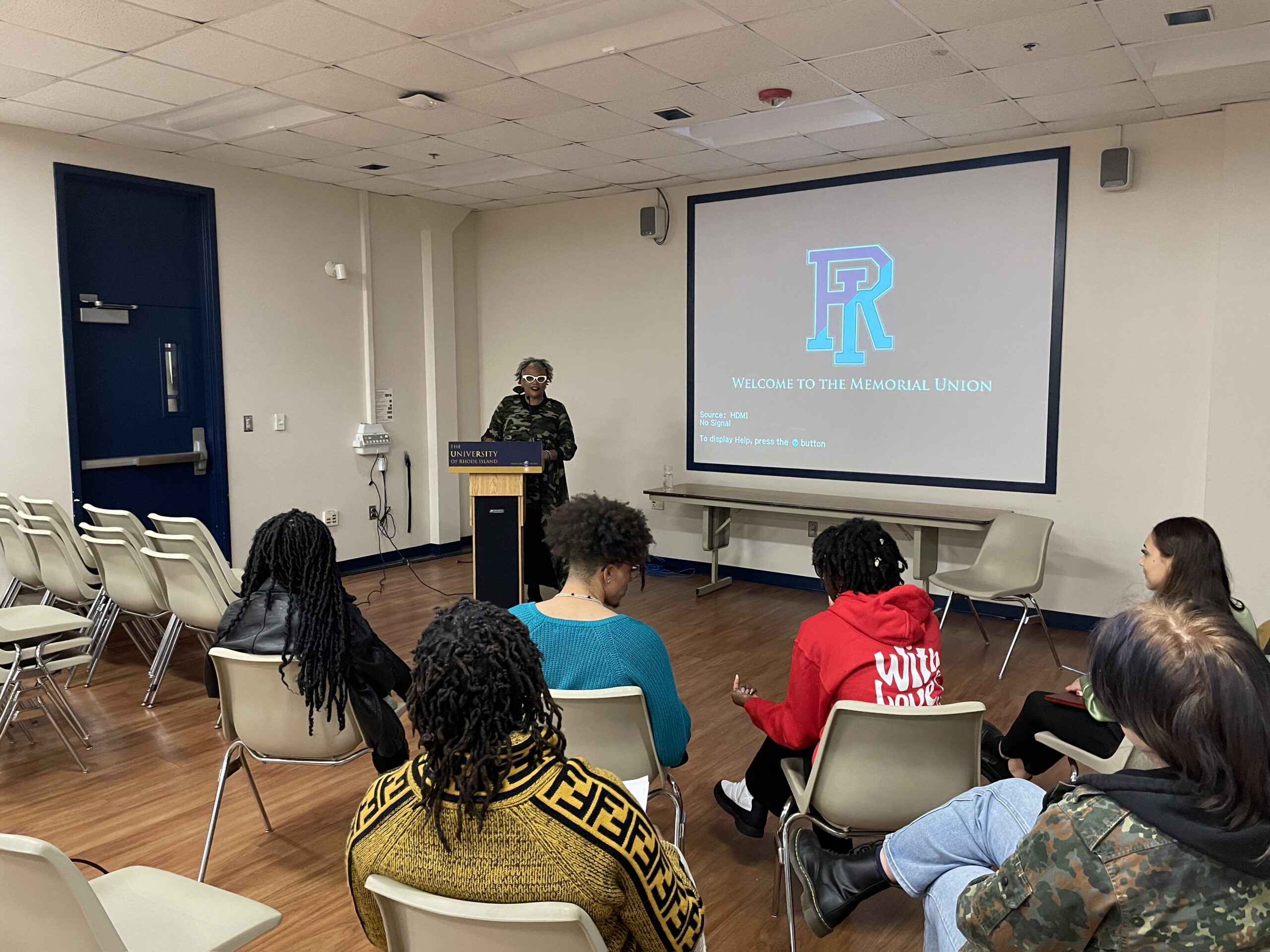Students perform poetry for a chance to win a cash prize. PHOTO CREDIT: David Broccoli | Entertainment Editor
The Africana Studies department at the University of Rhode Island held a full schedule of events this past week and welcomed the head of the Women and Development Unit at the University of West Indies Open Campus, Caribbean Scholar and Performance Poet Taitu Heron.
This poetry jam/open mic night was hosted and put together by the Africana Studies Student Advisory Council and went from 5-7 p.m. However, there was some confusion with the time and some attendees weren’t aware of what time the event actually started because the times online and on some flyers said 5:30 p.m.
The competition featured prizes for the best performance. The first place prize was $250, second prize was $100 and third prize was $50.
The actual readings didn’t start until 6 p.m. due to a lack of attendance in the first 30 minutes.
Joe Amaral, fourth-year double-major in communications and Africana Studies, talked about the importance of the student council and the Africana Studies major as well. He mentioned that there’s only eight to ten people in the major, and how they’re trying to get more people involved in the major.
“I think our original purpose was to figure out how to build up the major,” Amaral said. “So, how to get there to be more people in the program. So, recruiting, that was one of our initial purposes. And we want to build up the program and want it to be more of a prominent program and major at the University, but also, beyond that, Dr. John-Camara brought us in to think about how to restructure and build up a new curriculum for Africana Studies.”
Heron talked about poetry alone and why an event like a poetry jam is important for people to come together and share their work. She said that it’s all about being able to express yourself freely, whether or not you’re a poet. It allows you to gain a creative aspect of University life, not just strictly academics.
Catherine John-Camara, professor and department chair of Africana Studies, also talked about the importance of a poetry jam/open mic-night and how poetry itself is like a language in many different aspects.
“I think that poetry is what I would call one of the primal arts,” John-Camara said. “It’s biblical language, it’s ceremonial language, it’s ritual language. It’s kind of the language of the spirit. So, sometimes people can express things through poetry that they can’t express directly.”
John-Camara went on to talk about how she believes that two things happen when you have poetry readings. One is that the emotions of the people sharing their poems and the emotions of the listeners are expressed very openly and freely.
The second is that it allows people to feel enabled whenever they feel like they are disabled. It lightens the energy and the spirit in a way that intellectual lectures and writings cannot. Heron listened and agreed with her on this adding that lightens doing the “heavy stuff” which could mean the workload of someone or just something that weighs down on them constantly.
The time came for the jam to begin, and everyone in the audience came to the consensus that the judges should share their work first to get everyone started and to open the event.
John-Camara went up to the stand first and asked the audience which two of her four poems she should present. The choices were a political poem, a colorism poem, a poem written after her fathers death and a poem to a lost lover. Everyone in the crowd agreed that she should read her colorism poem and her poem about her father.
The colorism poem was titled “Hopeful Shadings” and was very short, but it had a very deep meaning on the topic of colorism. The poem about her father was titled “What The Flesh Knew” and was a very heartfelt poem about her father who passed away sadly.
Heron went up next and read four poems. She also mentioned that it was her first time reading/presenting in America so she was excited for that. The first poem she read was titled “Petition to Yemoja” in which she started out singing in a foreign language, and then read the poem. Her next poem was called “She Held Me” which was about a former partner of hers and some parts were also written in Jamaican. Her next poem was titled “Quarantine” which was about COVID and her final performance was called “Mango Season,” which was about mangoes.
After they presented, it was time for the contestant to present their poems. There were only three contestants so everyone won a prize.
The first contestant was Amaral, and he presented three poems which were all amazing, and everyone loved them. The first one he presented was titled “Can’t You See,” and was a political poem. His next poem was titled “Descending Into Madness” and his last poem was called “Nonsensical.”
The next contestant was Ibiolatiwa (Ibi) Akomolafe and she also presented three poems which everyone loved. Her first poem was called “Miraculous Vessel of Women,” her second poem was “Astral Projection,” and her last poem was “Ibiolatiwa.”
Brandon Feliz was the last performer and he presented a letter to someone he couldn’t talk to anymore. The judges deliberated and named Ibi the winner, Joe second place and Brandon third place.
The Africana Studies program and major is very disciplinary according to Amaral, and it covers a bunch of different subjects about culture, politics and history in Africa. It’s a really interesting program with a bunch of interactive events that deserve a lot of love and attention.




